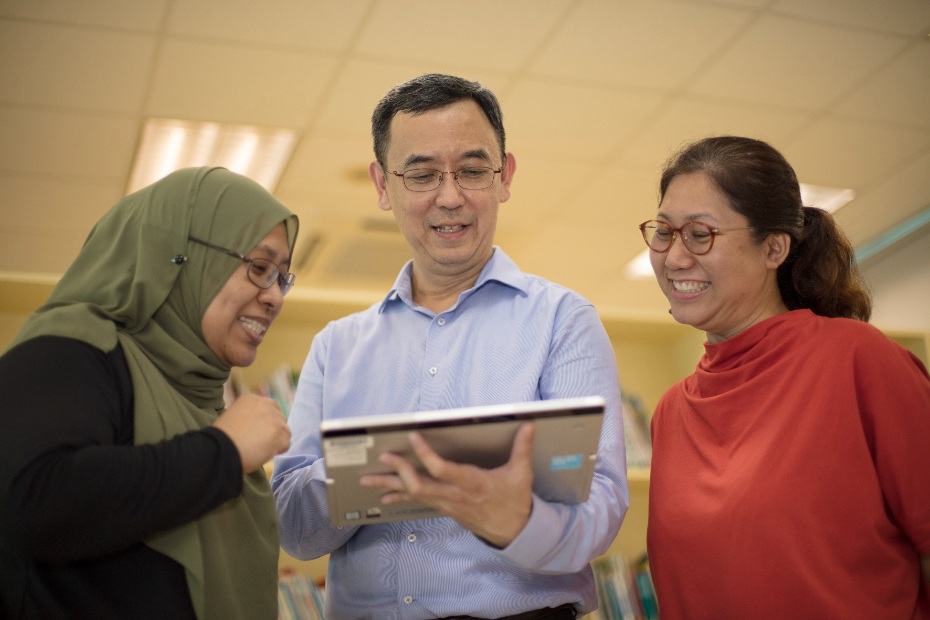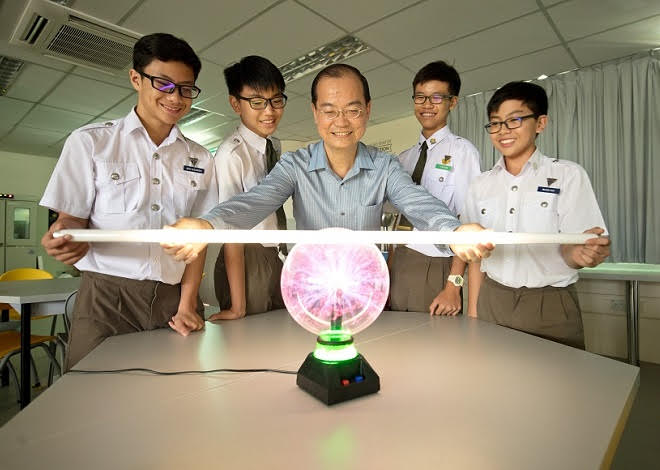Mr Kok Boon Siang, St Anthony’s Primary School, President’s Award For Teachers 2022 Finalist
A conspicuous plastic jar with a red lid sits on a table in Kok Boon Siang’s Primary 1 class. Before lessons begin, he digs into the jar, pulls out pieces of neatly folded paper and faces his students with a broad smile.
It’s a simple daily icebreaker that allows the young children in their first year at school to get to know him better day by day. They pop questions into the red jar – he calls it his Question Bank – with no rules for what they can ask him.
Boon Siang, the Lower Primary Year Head at St Anthony’s Primary School who teaches PE and Health Education, is a big fan of dramatising his lessons. He is an even bigger fan of love.
“Learning to live a life of gratitude starts early. The love that you give is often multiplied manifold.”
“When a teacher shows students love by taking even just a few minutes a day to answer their questions, they will gradually be inspired to have an inquiring mind. That’s important for their learning journey.”
Encouraging kids to love their neighbours
Evidently, Boon Siang takes love seriously. The educator of 25 years speaks in gentle tones about realising his vision of care for his students and his peers; he embeds it into the school’s culture through the programmes he designs and runs.
Together with the rest of the Student Development Team, Boon Siang spearheads programmes that develop the students’ social skills and other key skills, including self-management and resilience.

Inspired by the Lasallian mission of empowering students “to learn how to learn and to learn how to live”, Boon Siang advocates that students also “learn to love and love to learn”. He teaches his students about expressing their love to their friends, families and neighbours, and to live a life of gratitude.
In one such initiative, he encouraged his students to pen thank-you notes to frontliners during the COVID-19 pandemic in 2020.The result: heartfelt well-wishes on coloured paper were turned into stunning collages and sent to organisations such as SMRT, the National Centre for Infectious Diseases and the Singapore Armed Forces.
These organisations in turn showed their appreciation by writing thank-you emails and letters back to the school, making it an important teaching moment for the students.
“Learning to live a life of gratitude starts early. The love that you give is often multiplied manifold,” Boon Siang explains. “Academic performance is important, but so are these values and soft skills that will help our students thrive in the future.”
Boon Siang believes that students develop their love for learning when they are provided with opportunities to take ownership of their own learning. He gives his students the autonomy to construct their own games given a set of PE equipment and simple rules. The students are highly engaged and work together as a team to enjoy the games they co-construct with their peers.
Parents are important partners for the success of the “learn to love, love to learn” philosophy. Boon Siang and his colleagues take steps to build rapport with them through webinars and online workshops, so that they can understand the basis and impact of the initiatives. With their buy-in, parents can lend support more readily and reinforce the same self-management techniques for their children at home.
Happy parents have shared how much easier it is to get their children to put away stationery into their pencil boxes after use instead of leaving them strewn on the table – just as they do in class.
What goes around, comes around
Boon Siang puts his own soft skills to work in other areas. Close to his heart are students who come needing more support to keep up with others, namely children with special education needs (SEN) and those from disadvantaged backgrounds.
Having seen how his friends and relatives who have children with SEN struggle to cope with even their day-to-day activities, Boon Siang was determined to make a difference by playing his part. After all, a good day in school could spell a good day at home, and vice versa. To better understand the needs of children with conditions such as ADHD, autism and dyslexia, he attended courses at the National Institute of Education and obtained a Certificate in Special Needs Support. Following his training, he is mindful, for instance, about providing primers for autistic children to avoid surprises that may upset them.
He also applies the growth mindset when engaging children with SEN by removing any preconceptions about their abilities. For instance, he forms peer support groups comprising children with SEN, harnessing the strengths of their common understanding of one another. He saw how a boy with dyslexia grew to help a boy with autism and was encouraged by the friendship that blossomed from there, he says.
For children from vulnerable families, Boon Siang works with a teaching team to run ASCEND, an after-school care programme that ensures they have a diet of healthy and supervised activities in the afternoons. Currently, about 20 children from Primary 4 to 6 attend the programme, where they do their homework, explore interests and develop skills or play games in school.

The programme gives him greater visibility of the problems the students may be facing at home. Asked what some of these problems could be, the dramatic side to Boon Siang takes a backseat as his mind riffles quietly through the scenarios he has seen.
He shares how some years ago, he and his colleagues started to notice that a certain Primary 2 student was frequently absent from school. They paid a home visit and learned that the boy’s father was working the night shift and would return home at 4am before going to bed. His mother had just had a baby and was too exhausted to tend to her older child.
Boon Siang and the school counsellor met with the father to impress upon him the importance of school attendance. It took some months to convince him that adjustments had to be made to fetch the boy to school. In the meantime, the boy was enrolled in ASCEND so that his after-school needs would be met.
Over time, the boy showed up for school regularly. “The father appreciated what I did for him,” says a happy Boon Siang. The father then sought a way to give back to the school. Seeing as how Boon Siang was in the school’s Safety Committee, he found a practical need he could meet – road safety. “‘Mr Kok, you want any traffic cones for the school carpark? I can donate to the school’” recalls a smiling Boon Siang of the parent’s line, turning his acting voice back on. “I’m very appreciative of that.”
Mentoring on building school culture and other tricky situations
In recognition of his experience at forging stronger values in his students and colleagues, the school has been assigning Boon Siang to mentor other educators at the school cluster level.
Currently, he mentors three teachers under a peer programme titled W4lk With Me to conceptualise ideas to build a dynamic culture in their schools. They shared their plans with him and were supported with his guidance in their execution.
Informally, he has an open door to counsel and advise new teachers, especially in tricky situations where experience could help.
He cites an example of how there was a new teacher who was feeling very responsible towards her new charges and wanted to instil homework discipline in all of them. A parent perceived her actions as picking relentlessly on her child and sent her a barrage of texts on the matter.
The teacher was upset, not knowing how to handle the situation, and Boon Siang offered to share with her a different perspective. He suggested that lowering her expectations was not tantamount to reducing the child’s chance at success – on the contrary, it could help him see that the next goal was reachable. He also called for a face-to-face meeting between teacher and parent, with him as moderator. “We came to a common understanding,” he shares.
Why is Boon Siang so passionate about spending time on his colleagues?
“The quality of our education system depends on the quality of our teachers,” he says plainly. “Mentoring teachers can help to unleash their potential to become educators who deliver the best outcome for every child.






